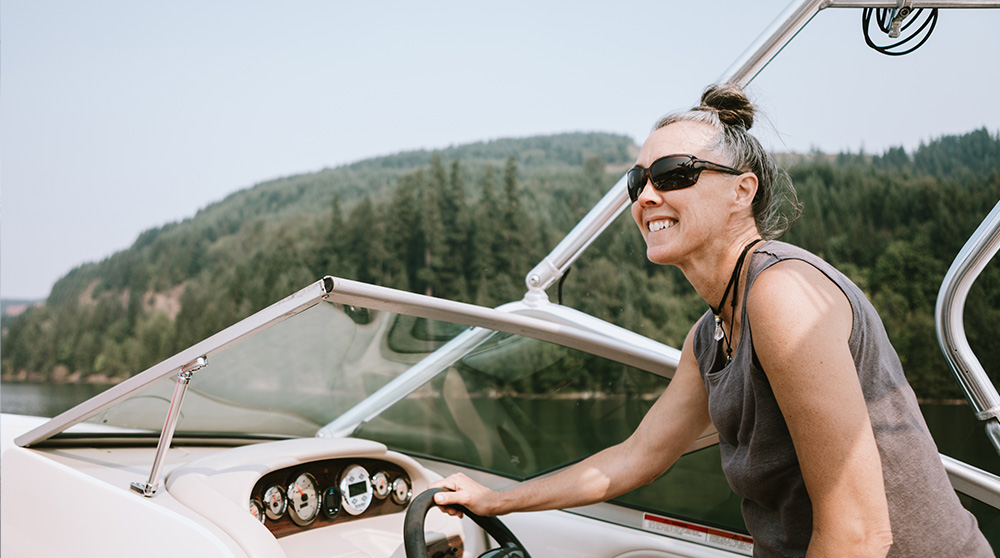Smooth sailing: Essential boating safety tips every boater must know.

Did you know? A staggering 74 percent of boating fatalities in 2022 took place on boats where the operator lacked proper boating safety training. That’s why, in addition to taking boating safety courses, all drivers and passengers need to follow fundamental boating safety tips.
Because safety is paramount on the water, keeping these tips top of mind for every ride is key.
Boating safety tips for drivers.
Get to know your boat. Familiarize yourself with every part of your vessel. Understand how it operates, including how to start and stop the engine, how to navigate, how the lights work, and how to use safety equipment, such as radios and distress signals.Stick to a maintenance schedule. Schedule a maintenance check before winterizing your boat and before it goes in the water for the first ride of the season. If you hear, see, or smell anything abnormal throughout boating season, get your boat checked right away. Don’t put off repairs.Check the weather before setting sail. Check the weather forecast for the immediate and surrounding areas before heading out on the water. Don’t look only at the upcoming hours, look for systems that could come later in the day, too. Whenever possible, avoid boating in rain, wind, and other severe weather conditions.Communicate your boating plans with loved ones. Before departing, tell a reliable individual about your boating plans, including your intended route, estimated time of return, and who they could contact on board.Keep life jackets handy. The importance of wearing a life jacket cannot be overstated. Accidents on the water can happen unexpectedly, and a life jacket is your first line of defense against drowning. Have a properly fitting life jacket for each passenger on board, especially children and non-swimmers.Stay sober and alert. Boating under the influence of alcohol or drugs significantly impairs judgment and reaction time, increasing the risk of accidents. Designate a sober captain to operate the boat.Keep an eye on fuel levels. Keep track of your fuel levels throughout your journey to avoid running out of gas unexpectedly. Plan your route with refueling stops in mind, and always carry extra fuel as a precautionary measure.Prepare for onboard emergencies. Equip your boat with essential safety gear, such as a first-aid kit, fire extinguisher, signaling devices, paddles, and a throwable flotation device. It’s equally important to know how to use each item in case of emergency.Don’t drive distracted. Fatigue and distractions, like cell phones and music, can be just as dangerous on the water as they are on the road. Avoid driving your boat while you’re tired or distracted. Take breaks, switch drivers (if possible), and stay focused on navigating safely. It’s your most important job.Use proper lighting. Early in the morning, in low-visibility conditions, or as night dawns, turn on your navigation lights. The lights help other boaters see you and help reduce the risk of collisions.Practice proper docking and anchoring. Master the art of docking and anchoring to avoid collisions and drifting. Practice maneuvering your boat in different conditions and familiarize yourself with anchoring techniques. Securely anchor your boat when you’ve stopped to prevent it from drifting unexpectedly.
Boating safety tips for spotters.
Before starting any watersports (like tubing, wakeboarding, water skiing, or knee boarding), elect a spotter. This person should be facing backward in the boat, so their eyes are always on the person being towed. Spotters are responsible for informing the driver about the status of the person being towed and any other hazards around the boat. If you’re a spotter, remember these safety tips.
Monitor your surroundings. Keep your head on a swivel of the surrounding area. Watch for potential hazards, including other boats, swimmers, buoys, shallow water, and submerged objects. Be especially vigilant in high-traffic areas or areas with limited visibility, such as sharp turns or congested waterways.Be prepared to react quickly. React swiftly and decisively in emergencies or unexpected situations. If someone or something falls in the water or another boat encroaches on your space, stay calm and focused while following established emergency protocols.Always be aware. Your primary responsibility as a spotter is to constantly keep an eye on the person being towed. Avoid distractions and remain focused on the activity behind and around the boat to anticipate any potential hazards or signs of distress. If you must take your eyes off your surroundings, tap another passenger in while you look away.Communicate signs and signals. Establish clear communication signals with the driver of the boat and the person being towed before starting any water sports. Ensure everyone is using the same signals for things like “I’m okay,” “faster/slower,” “waves ahead,” and “I’m done.”Know how to drive and dock the boat. If the driver has an emergency or someone else needs to take over the wheel, you should be prepared to step in. Learn basic driving and docking protocol before heading out for the day. It’s always best to have more than one experienced driver on board.
Ensure smooth sailing and peace of mind for you and your passengers by applying these boating safety tips. Looking for more advice or protection for your next boating adventure? Talk to one of our local, independent agents about coverage today.
This content was developed for general informational purposes only. While we strive to keep the information relevant and up to date, we make no guarantees or warranties regarding the completeness, accuracy, or reliability of the information, products, services, or graphics contained within the blog. The blog content is not intended to serve as professional or expert advice for your insurance needs. Contact your local, independent insurance agent for coverage advice and policy services.







